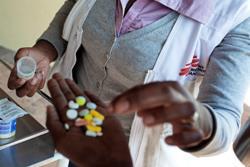Love, stigma and HIV


In his late 30s, Matekane suffered a minor stroke and discovered he was HIV positive.
“If it wasn’t for the minor stroke, I wouldn’t have gone for HIV testing and probably wouldn’t have known my HIV status”, said Matekane. “I maybe would have continued not using condoms.”
Like many people newly diagnosed with HIV, Matekane struggled to cope with a range of emotions after he discovered his HIV status including anger and blame.
“I don’t what to lie because I was furious the few months after my diagnosed because I was struggling to accept my HIV status,” said Matekane, who remains partially paralysed on his right side from the stroke and must walk with the aid of crutches.
“Things in my life spiral out of control,” he added. “Yes, I had always smoked and drank alcohol, but my diagnosis made (these) things worse than ever.”
Matekane as increasingly turned to smoking and drinking for comfort, he also became increasingly verbally abusive to his partner, Jabulile Nkala, who had disclosed her own HIV-positive status to Matekane at the start of their relationship.
Despite knowing this Matekane said he had often deliberately chosen to not use a condom during sex, especially while under the influence of alcohol.
Although it is impossible to prove that Matekane contracted HIV within the relationship without expensive genetic testing, he believes that he did.
[quote float = right]I started inflicting pain to my partner by discriminating against her and calling her bad names,”
“I started inflicting pain to my partner by discriminating against her and calling her bad names,” Matekane admitted. “I wanted her to feel my pain and understand my anger.”
According to the country’s first HIV stigma index released earlier this year, almost 90 percent of people living with HIV disclose their status to their partners just like Nkala.
About 35 percent of those surveyed as part of the index reported experiencing verbal abuse like Nkala based on their HIV statuses. Almost an equal percentage of those surveyed reported experiencing physical violence they believed was tied to their HIV status.
An estimated 6.8 million people are living with HIV in South Africa, according to UNAIDS.
For Nkala, Matekane’s behaviour also put her at the mercy of other community members who she said also stigmatised and belittled her.
Matekane eventually turned to his younger sister, Sinhle, for solace.
“Because of my younger sister’s support, I accepted my stroke and HIV status,” he said. Blaming my partner for infecting me was an ignorant act on part because it was my responsibility as well initiate condom (use).”
Nkala said that while the two have mended the relationship, she has trouble forgetting the nasty things Matekane said to her.
“I experienced such emotional pain from my partner, Andrew, for almost a year,” Nkala told OurHealth. “He changed and apologised, but I still remember that pain, and the judgmental comments and discrimination I got from people because of him”.
Matekane says the two are now on antiretrovirals and support each other as treatment buddies, with each making sure the other takes their HIV medication daily.
Even if both partners have HIV, partners should still use condoms to avoid becoming re-infected with additional strains of HIV that may complicate treatment and lead to drug resistance.
- Watch the latest Health-e News documentaries online
- Read more from OurHealth citizen journalist Cynthia Maseko
Author
Republish this article
This work is licensed under a Creative Commons Attribution-NoDerivatives 4.0 International License.
Unless otherwise noted, you can republish our articles for free under a Creative Commons license. Here’s what you need to know:
You have to credit Health-e News. In the byline, we prefer “Author Name, Publication.” At the top of the text of your story, include a line that reads: “This story was originally published by Health-e News.” You must link the word “Health-e News” to the original URL of the story.
You must include all of the links from our story, including our newsletter sign up link.
If you use canonical metadata, please use the Health-e News URL. For more information about canonical metadata, click here.
You can’t edit our material, except to reflect relative changes in time, location and editorial style. (For example, “yesterday” can be changed to “last week”)
You have no rights to sell, license, syndicate, or otherwise represent yourself as the authorized owner of our material to any third parties. This means that you cannot actively publish or submit our work for syndication to third party platforms or apps like Apple News or Google News. Health-e News understands that publishers cannot fully control when certain third parties automatically summarise or crawl content from publishers’ own sites.
You can’t republish our material wholesale, or automatically; you need to select stories to be republished individually.
If you share republished stories on social media, we’d appreciate being tagged in your posts. You can find us on Twitter @HealthENews, Instagram @healthenews, and Facebook Health-e News Service.
You can grab HTML code for our stories easily. Click on the Creative Commons logo on our stories. You’ll find it with the other share buttons.
If you have any other questions, contact info@health-e.org.za.
Love, stigma and HIV
by cynthiamaseko, Health-e News
November 4, 2015



